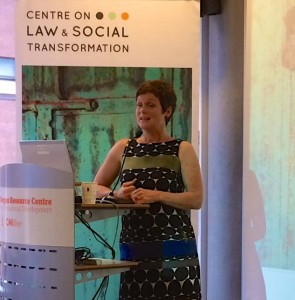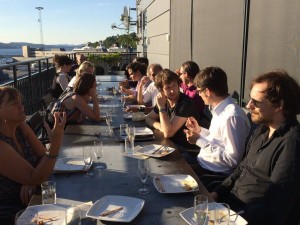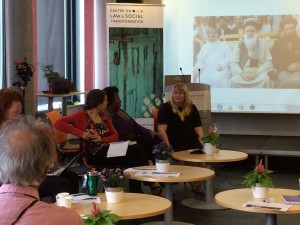The second annual Bergen Exchanges on Law and Social Transformation took place from 17-21 August 2015 at the Bergen Resource Centre. Around 80 scientists, scholars and students from all continents participated in debates, round tables and lectures.
Across the wide range of topics discussed, lawfare – the use of law as a political tool and instrument for social change – was at the centre. On the opening day, a panel of researchers presented work in progress from their ongoing project Abortion Rights Lawfare in Latin America, which investigates how both progressive and conservative activists use litigation and law-reform in their fight over access to legal abortion. The panel was chaired by project leader Rachel Sieder (CMI/CIESAS, Mexico) and Ruth Rubio Marin (European University Institute) commented. This was followed by round table discussions on how to best study compliance with court orders and the effects of lawfare, set off by interesting introductions by Daniel Brinks (University of Texas) and Paola Bergallo (Palermo University, Argentina). And to round off the first day: a reception at Knut Fægris Hus.
See the detailed program for the whole week here.
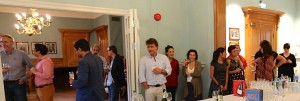
RECEPTION: Seminar participants enjoyed live jazz music and tapas in Knut Fægris Hus on the opening evening of Bergen Exchanges.
Battles and backlash
Thomas Keck (Syracuse University) started off the second day by explaining how “backlash” – diverse political reactions against legal mobilization – can be studied. This was followed by a panel-discussion on the complicated conceptual and methodological questions that arise in studying political backlash.
The following session focused on global battles over the rights of gay, lesbian, bisexual, transgender, intersex and queer people (LGBTIQ), and on how progressive and conservative activists increasingly make use of courts at national and international level. The panelists presented work in progress from two LawTransform research projects on “Sexual & Reproductive Rights Lawfare”. The regional overviews and a diverse case studies (India, Uganda, Malawi, Austria, Argentina) provided the basis for a lively debate on what the increasing political contestation over sexual orientation and gender identity we have seen in all parts of the world means for sexual and reproductive rights, and on the role played by courts in these battles.
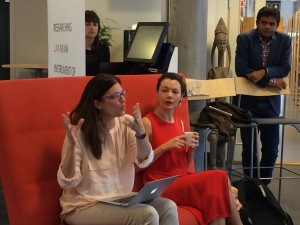
ARGENTINA: Paola Bergallo (left) leads the work on the Argentinan case for the research project on “Sexual & Reproductive Rights Lawfare: Global Battles”. Here with her collaborator, Agustina Ramón.
The afternoon featured a panel on constitutional change Håkon Gjerløv (University of Oslo) presented a new research on effects of constitutions while Ruth Rubio Marin (EUI) , introduced her newproject on gender and constitution-making. The last session of the day – a round table led by Malcolm Langford (CMI and University of Oslo) – discussed the building and use of databases in mixed method research and challenges of integrating qualitative and quantitative research. Tired but inspired after a long day, the participants gathered for an informal social evening.
Annual lecture: Gerald Rosenberg
Day three started with a focus on health and livelihood. The first panel, What does the right to health mean in practice, was led by Henrette Aasen (University of Bergen, UiB). Two African judges, Mumbi Ngugi (High Court, Kenya) and Lilian Tibatemwa (Supreme Court, Uganda), discussed the challenges of adjudicating the right to health in resource-scarce settings (and generally) with experts on priority setting in health and on judicialization of health rights, including Octavio Ferraz (King’s College London) and Ole Frithjof Norheim (UiB). This was followed by a round-table on the health consequences of criminal law, with a focus on criminalization of abortion and homosexuality and how this can best be studied. In this session, which was introduced and lead by Jørn Jacobsen (UiB) two about-to-start research projects addressing the issue were presented by Ana-Cristina Gonzales and Siri Gloppen. The last round-table of the day asked under which conditions poor and “informalized” people’s lawfare for livelihood contributes to meaningful social change, featuring introductions by Jackie Dugard (University of the Witwatersrand, South Africa) and Adriana Ruiz-Restrepo (Colombia).
In the afternoon, Gerald Rosenberg was at the center of the stage, delivering the 2015 Annual Lecture on Law & Social Transformation: “The Hollow Hope Revisited: On the Impact of Marriage Equality Litigation in the USA”. His book “The Hollow Hope” (1991) forcefully argued that litigation is unlikely to bring significant social change. A quarter of a century later, it remains the standard reference, but today many argue that the recent developments regarding same sex marriage in the United States – where litigation has been central – challenges Rosenberg’s view. Rosenberg gave his analysis in a insightful and entertaining lecture to an engaged crowd, comprising participants in the Bergen Exchanges as well as other scholars and students who had found their way to the lecture hall at the Faculty of Law to listen to Prof. Rosenberg. Excellent comments by Tom Keck, Malcolm Langford and Therese Squatrito (PluriCourts, U Oslo) engaged Rosenberg’s arguments and set the stage for the debate.
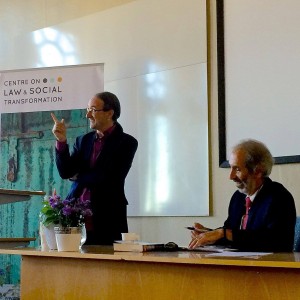
ANNUAL LECTURE: Tom Keck (left) makes his points of disagreement clear after Gerald Rosenberg’s lecture on the impact of marriage equality litigation in the USA.
After the lecture a reception was held in the evening sun at the top floor and roof-top terrace of the CMI building.
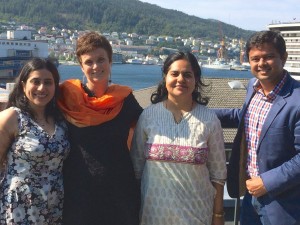
ROOFTOP: The India Land Rights-team gathered on the CMI terrance – Namita Wahi (CPR, Delhi), Siri Gloppen, Kvaita Søreide (CMI) and Pallav Shukla (CPR).
High activity and great variation
The penultimate day offered a variety of topics and sessions. In the first session Elin Skaar (CMI), Camila Gianella (UiB) and Trine Eide (University of Tromsø) presented their new book “After violence: Effects of Transnational Justice Mechanisms” with Rachel Sieder as an excellent discussant. The book examines the effects of transitional justice on the development of peace and democracy, combining case studies (Uruguay, Peru, Rwanda and Angola) and comparative qualitative analysis, it looks at the countries’ experiences of their history of violence through a combination of four different transitional justice mechanisms: criminal trials, truth commission, reparations, and amnesties.
In the following roundtable, Liv Tønnessen (CMI), Torunn Wimpelmann (CMI)
and Samia al-Nagar, Sudan (Sudan) discussed Islamist lawfare and the materialization (or lack thereof), failure, successes and perils of Islamic feminism as a lawfare strategy, based on ongoing work in Afghanistan and Sudan.
In the first of the afternoon sessions Neil Datta and Paola Bergallo lead a round table focusing on how best to study “the dark side” or actors who are ideologically far removed from and actively working against a cause normatively supported by the researcher. This was followed by an engaged discussion on Welfare-state lawfare “in the best interest of the child”. Marit Skivenes set the stage, presenting her comparative research project looking into cases where the state takes custody of children and how practices and attitudes vary between countries.
A rich and instructive week
The last day of the conference also held great variation – and despite a long and packed week the energy levels and engagement remained high throughout the sessions. In the morning, Siri Gloppen chaired a panel where Namita Wahi, Pallav Shukla (both of CPR, Delhi) and Kavita Søreide (CMI) presented their work in progress from the ongoing LawTransform research project on Land Rights and Inclusive Sustainable Development in India’s federal system. The project explores the role of land rights in the context of the current development Indian development agenda, analyzing how land rights are being transformed and how different forms of regulations play out in various Indian states. Jackie Dugard commented on the panel and also chaired the subsequent roundtable on socio-environmental lawfare where Lara Cortes (CMI), Camila Ginanella (UiB), Bruce Wilson (CMI and University of Central Florida) and Yacotzin Bravo (CIESAS, Mexico) presented planned and ongoing projects investigating lawfare over water resources.
In the very last session of this rich and instructive week, focus was on judicial networks and the informal sources of judicial independence (or the lack of such). This was introduced by Alexander Stroh (University of Bayreuth) and Judge Mumbi Ngugi and Gunnar Grendstad (UiB) provided comments to start off this final , very engaged and insightful debate.
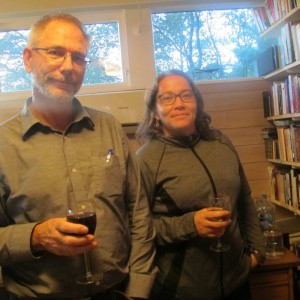
COURSE LEADERS: Bruce Wilson and Camilla Gianella were, together with Siri Gloppen, in charge of the first LawTransform PhD Course on “Effects of Lawfare”.
For some, the events of the week was just part of the experience. The PHD course “Courts and law as battlegrounds for social change” was organised by the Centre of Law and Social Transformation and the Social Science Faculty of the University of Bergen i parallel with Bergen Exchanges. It started the weekend prior to the conference and continued the weekend after, with additional lectures during the week. The PhD course was a mixture of lectures specifically designed for the course, presentations by the students of their own research projects, and participation in the workshops and open sessions of the Bergen Exchanges. The participants were able to interact with some of the foremost scholars in the field: Daniel M Brinks, Rachel Sieder, Tom Keck, Jackie Dugard, Liv Tønnessen, Torunn Wimpelmann, Ana Cristina Gonzalez and Adrian Jjuuko, in addition to the course leaders, Camilla Gianella, Bruce Wilson and Siri Gloppen.
Bergen Exchanges 2015 was an intense week of engagement on how law is used to change societies and to what effect, with lots of hard work but also laughs and frienship. We are very grateful to all the engaged participants and are already looking forward to next year’s Bergen Exchanges!

